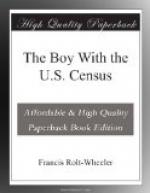“He’s a boy who started at work in this place when he was only seven years old,” the workman answered. “He’s been here eight years now, and he’s an odd genius. He taught himself to read and write, but he doesn’t read anything except about labor conditions all over the world, and he knows all there is to know, I guess, about this business of children working. All the labor union people and the socialists know ’the crusader,’ young as he is, and they send him, free, nearly every book and paper that’s published.”
[Illustration: YOUNG BOYS FROM THE PIT. A group of workers in a coal mine during dinner-time. Many even younger work on the night shift. (Courtesy of the Ridgway co.)]
“But why do you call him ’the crusader’?” asked Hamilton.
“Because he has some crusade idea on the brain,—thinks he can start a revolution or something that will put a stop to child labor, and he talks all the time of getting ready for this ‘crusade’ as he calls it. But everybody likes him just the same, and he’s a good worker—when he’s not talking.”
“Which is he?” asked Hamilton. “I’d like to talk to him, if I might.”
“No reason why you shouldn’t,” the other answered “he’s kept busy of course, but there are minutes in which he can talk, and ‘the crusader’ is given special favors, anyway. That’s the boy, ‘carrying in’ over there.”
Hamilton looked with interest at the boy thus pointed out. He would have been noticeable, even without the knowledge of his peculiar position, but with it, his difference from his fellows became most marked. Hamilton had a couple of large apples in his pocket, and he thought this might be a good opening. Taking one of them out of his pocket, he started to eat it, and sauntered leisurely over to where the boy was working. He watched him for a minute or two; then, when the boy looked up, he said casually:
“Have an apple?”
Almost wolfishly the work-boy took the fruit from Hamilton and commenced to devour it. It was clear either that he was hungry or that such a luxury as an apple seldom fell to his lot. A few sentences passed, and then Hamilton asked:
“How long have you been in the factory here?”
“Eight years,” ‘the crusader’ replied.
“You must have been just a youngster when you first came, then?”
“Seven years old,” was the answer, “and small at that!”
“It’s a shame to let little children work like that, I think,” said Hamilton, wondering whether this would have the effect of rousing the other, “it must do them harm.”
But even though expecting some fiery retort, Hamilton was unprepared for the transformation in the lad. A moment before he had been a stooped childish figure with an old and weary face, carrying trays of hot glass from furnace to bench and bench to furnace, but at the word he turned. The air of weariness fell from him, his back straightened, life and passion flamed into his eyes, and despite the grime and sordidness of his surroundings, despite the rags in which he was clothed, under the dull glow of the furnaces and the flickering violet play of a distant arc light he seemed the bearer of some high message as his boyish treble, rich in the tones of a familiar despair, rang through the factory.




